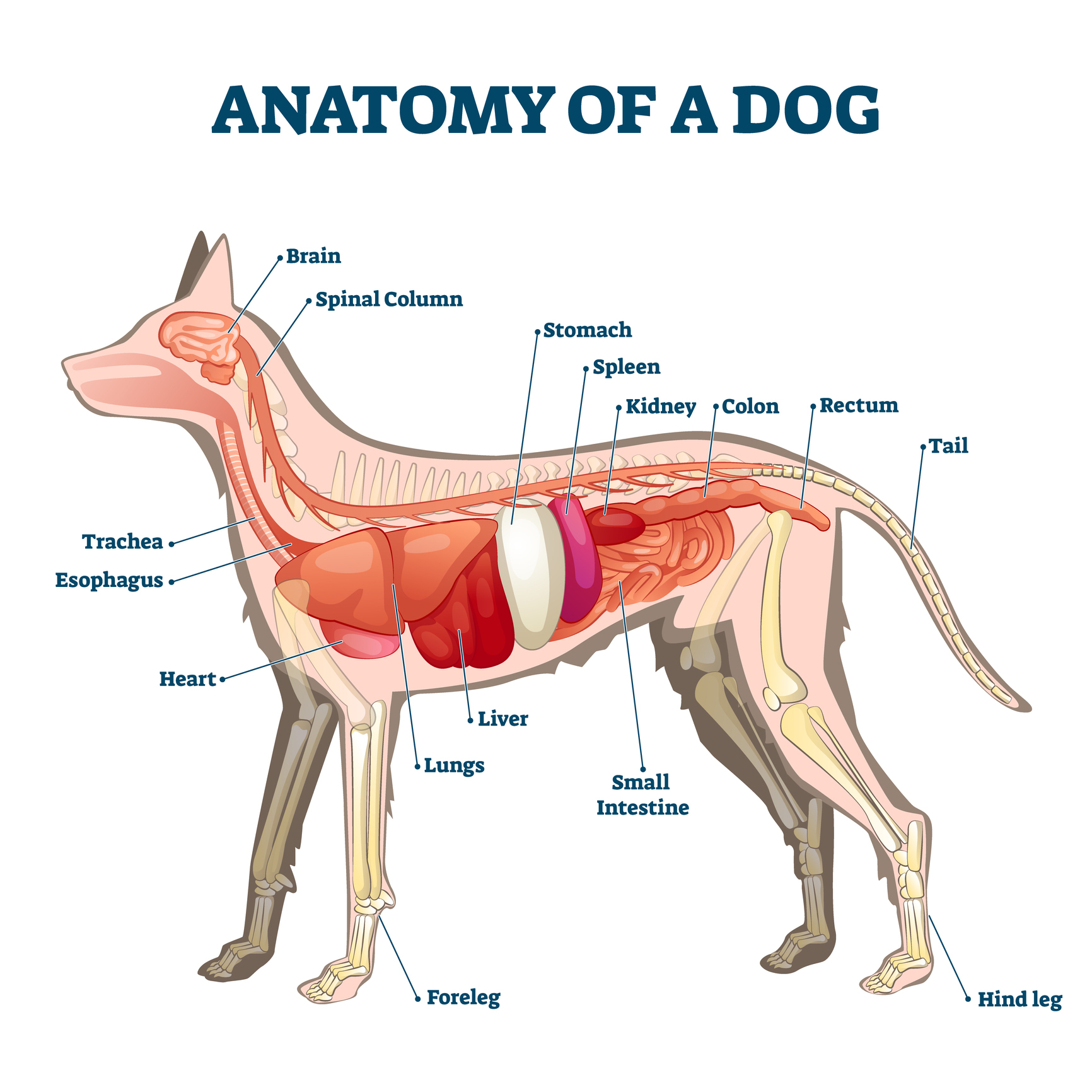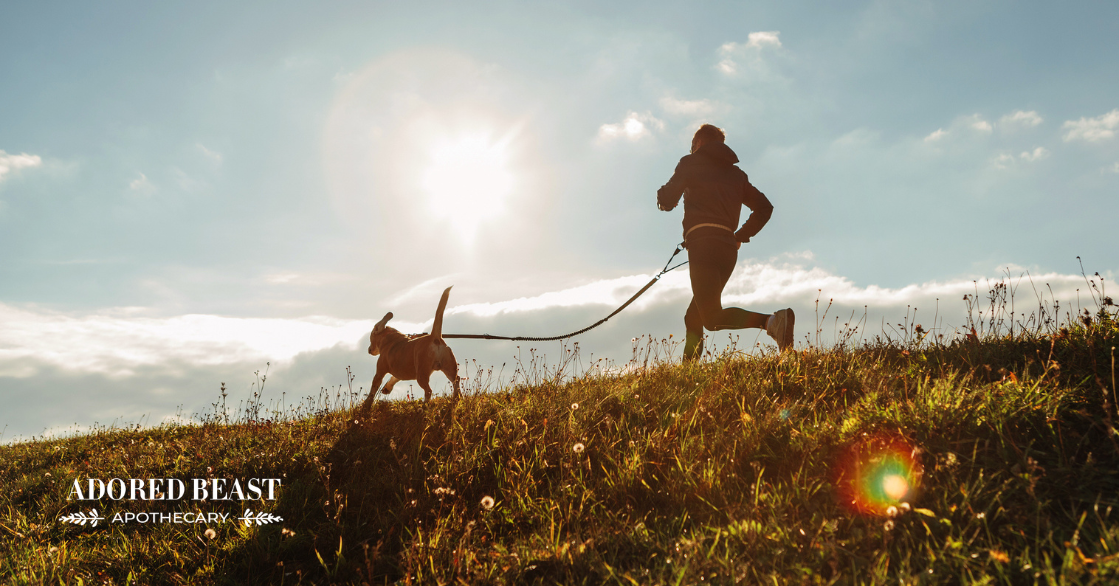Think about breathing…
It’s weird; it’s something every living being does, but we do it without thought. We take in oxygen, the body moves it through the body, and we express any carbon dioxide. Seems simple, but that downplays its importance.
After all, if we don’t breathe, we don’t live.
The lungs (and this includes dog lungs of course – we are talking about animals, after all) are impressive organs with a big job.
And knowing that, and how important lung health is to our dogs’ overall health, we want to do all that we can to support them.
This week, we’re talking about the lungs, respiratory health, and the things we can do to help our dogs breathe easier.
Dog Lungs & The Respiratory System
Dog lungs are a set of two organs in the respiratory system that sit at the intersection of a crucial part of the body. The anatomy of the respiratory tract varies among species. For example, the respiratory systems of dogs and cats are somewhat similar to each other, but differ from the respiratory systems of horses and humans.
But the basic function is the same – the lungs do the same sort of thing no matter the species.
When your dog takes a breath, they take in air through the nose and mouth. This air travels down their trachea through tubes called bronchioles, then into the lungs. That’s a very simple explanation of course.

This journey delivers oxygen into the blood, which distributes it throughout the body, all the while removing wastes such as carbon dioxide.
The respiratory system as a whole does a lot more though:
- Filters out large airborne particles
- Destroys small particles and microorganisms that threaten the immune system
- Facilitates the sense of smell
- Helps regulate temperature (for example, when dogs pant to help keep cool)
Unfortunately, with such a major role, that means there’s risk of damage or disease to the respiratory system. There are several different disorders that can affect dogs, including:
- nasal disorders
- laryngitis
- brachycephalic syndrome
- laryngeal paralysis
- polys and tumors
- cancer
- edema
- pulmonary contusions
Symptoms of breathing problems in dogs can include rapid breathing, snoring, wheezing, choking, lowered and extended head, flared nostrils, and breathing through the mouth without panting. These may be a sign of seasonal allergies, being overweight, kennel cough, heartworm, pneumonia, or some other condition, such as those listed above.
**Remember, if you notice these symptoms, or are concerned about your dog’s lung health, speak with your trusted veterinarian.
Respiratory System Support
Ok, we know that dog lungs (and the rest of the respiratory system) have a big role to fill in the body. So, let’s do all we can to support them!
These tips can help protect your dog’s airways, making breathing easier, and helping to prevent issues from occurring.
1. Remove Irritants
There are many things that can irritate dog lungs (and the entire respiratory system), so you want to eliminate these as much as possible.
- Consider moving to natural cleaners in your home
- Avoid the use of air fresheners, fabric sprays, or scented candles
- If your pet has environmental allergies, wipe paws and legs after being outside
- Consider an air filter inside to help cleanse the air of potential irritants
P.S. This is also really good for YOUR respiratory health!!
2. Helpful Herbs
Several different herbs are helpful for supporting respiratory health. Many have an affinity for the lungs and respiratory system! These include:
- Marshmallow root – with its high mucilage content, marshmallow root has strong demulcent properties, which can help reduce swelling and irritation in the mucous membranes and support calming in the respiratory tract
- Slippery elm – another demulcent herb, slippery elm coats the respiratory tract, which, like marshmallow root, can help to soothe irritated tissues and mucous membranes
- Licorice root – another demulcent herb, licorice roots can help to soothe inflamed mucous membranes and it also has decongesting and expectorant properties. We recommend only using deglycyrrhizinated licorice (DGL) because it has the glycrrhizin removed.
- Mullein – it’s famed for its use with respiratory issues. Similar to marshmallow, it has a high mucilage content, and because of its saponin content, mullein also acts as an expectorant, meaning it makes it easier for the lungs to clear themselves of mucous.
3. Supportive Supplements & Foods
There are many different supplements that you can introduce to help support dog lungs and the respiratory system. Consider adding any or all of the following:
- Omega-3 fatty acids – new research suggests omega-3s can play a significant role in lung health. The study specifically found that higher levels of omega-3 fatty acids in the blood are associated with a reduced rate of lung function decline and that higher levels of omega-3 fatty acids – including DHA – are associated with better lung function.
- Vitamin C – diets rich in vitamin C have been shown to help improve and protect lung function. Consider adding some fruits and vegetables containing vitamin c to your dog’s diet, including oranges, broccoli, cabbage, and Brussels sprouts, kale, papaya, mango, and kiwi fruit.
- Antioxidants – antioxidants, specifically carotenoids like beta-carotene, can help to protect the lungs and respiratory system.
- Lung (organ meat) – like feeds like!
- Pears – moisten the respiratory tract and may help prevent coughs
- Honey – just as with pears, honey (raw and local is best!!) can help moisten the respiratory tract
- Eggs – another moistening food
- Pumpkin and winter squash – these two help strengthen the large intestine, which in TCVM is connected to the lungs
If you’re a follower of TCVM, many of these foods are on the list because of their influence on lung health.
4. Keep Weight in Check
If your pet is overweight, this puts added stress on the entire body, including the respiratory system. You want this system to be able to function at its peak, without pressure or strain.
To help your dog achieve and maintain a healthy weight:
- Consider how much exercise you provide (meet their abilities)
- Think about swapping out high calorie treats for a healthier option, such as veggies or fruit (and cut back if you tend to overindulge)
- Support the gut to help it better digest food and metabolize fats
- Consider switching to a fresh, whole food diet rather than a highly-processed one
5. Detox the Body
Want to support the respiratory system? Support the other organs!
A great way to do this is with a gentle detox. Toxic build up puts pressure on the body, which means it has to work harder to do its job. And this can make it harder for every organ.
With a gentle detox, especially as the seasons change, you can help clean out the organs – the liver, kidneys, pancreas, and gallbladder in particular – to help rebalance and bring the body back to homeostasis.
Several herbs are good for this, including dandelion root, greater celandine, milk thistle, and barberry – all of which can be found in our Liver Tonic!
Even though we often forget about them, dog lungs need love and support just like the rest of the body. We all want to breathe easy, and our dogs are no different. With a little extra TLC, we can help support and protect lung and respiratory function and keep our animals healthy and happy! So get out there for a romp together, breathe deep, and have fun!












